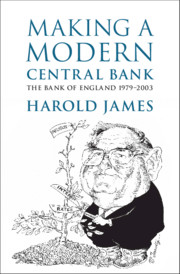Book contents
- Making a Modern Central Bank
- Studies in Macroeconomic History
- Making a Modern Central Bank
- Copyright page
- Dedication
- Contents
- Figures
- Tables
- Acknowledgements
- Abbreviations
- 1 Introductory
- 2 Foreign Fetters
- 3 The Performance of the UK Economy
- 4 The Inexplicable in Pursuit of the Uncontrollable
- 5 ‘A Good Deal of Advice’
- 6 The Long Shadow of the Deutschemark
- 7 Hong Kong
- 8 Shaved Eyebrows
- 9 Tunnelling Deep
- 10 Great Leap in the Dark
- 11 The Spine Theory and Its Collapse
- 12 ‘You Can’t Be In and Out at the Same Time’:
- 13 Horses for Courses
- 14 Failure of Internal Communication
- 15 The New Bank
- 16 Epilogue
- Book part
- Notes
- Bibliography
- Index
7 - Hong Kong
Bank Crises and Currency Crises
Published online by Cambridge University Press: 18 September 2020
- Making a Modern Central Bank
- Studies in Macroeconomic History
- Making a Modern Central Bank
- Copyright page
- Dedication
- Contents
- Figures
- Tables
- Acknowledgements
- Abbreviations
- 1 Introductory
- 2 Foreign Fetters
- 3 The Performance of the UK Economy
- 4 The Inexplicable in Pursuit of the Uncontrollable
- 5 ‘A Good Deal of Advice’
- 6 The Long Shadow of the Deutschemark
- 7 Hong Kong
- 8 Shaved Eyebrows
- 9 Tunnelling Deep
- 10 Great Leap in the Dark
- 11 The Spine Theory and Its Collapse
- 12 ‘You Can’t Be In and Out at the Same Time’:
- 13 Horses for Courses
- 14 Failure of Internal Communication
- 15 The New Bank
- 16 Epilogue
- Book part
- Notes
- Bibliography
- Index
Summary
The Bank of England was heavily involved in the management of Hong Kong’s banking and currency arrangements. The shadow that continually hung over both was the prospect of the termination of the lease on the ‘Crown Colony’ in 1997. In the late summer of 1983, a property boom collapsed and brought major financial strain and an exchange rate crisis. The Bank sent experts who backed schemes to create a currency peg, managed by currency board arrangements, with a link to the British pound. That had implications for the positions of the large banks, which issued bank notes. There was also a question about the position of the large Hong Kong banks, and the largest, HSBC, wanted to acquire, or merge with, a UK bank: eventually HSBC took over Midland.
- Type
- Chapter
- Information
- Making a Modern Central BankThe Bank of England 1979–2003, pp. 189 - 201Publisher: Cambridge University PressPrint publication year: 2020

